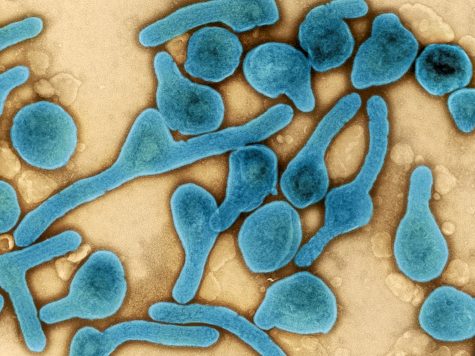Marburg Virus
May 11, 2023
We all remember when the world went on pause nearly three years ago when we first got word of a pandemic. Little did we know that this would dramatically change the rest of our lives. What if I told you another virus has been impacting the country of Equatorial Guinea? Unfortunately, this is the case because the new Marburg virus (MVD) spreads between people through direct contact with broken skin or mucous membranes with infected people’s blood, secretions, organs, or other bodily fluids. The first case of this virus was actually discovered in 1967. Yes…1967!
As you can see, this virus dates back, so it has been around but wasn’t very active until this year. The transmission of this virus is tricky as it travels in many ways. Healthcare workers have previously been infected while treating patients with suspected MVD. Burial ceremonies involving direct contact with the deceased’s body can also contribute to the transmission of Marburg virus. The development period varies from two to 21 days. Sickness caused by the Marburg virus begins abruptly, with high fever, severe headache, and severe malaise. Severe blood loss may appear between five and seven days from symptoms, and fatal cases usually have some form of bleeding, often from multiple areas.
The MVD case-fatality rate is 23-90%, and no specific treatment exists for this disease. Hospital therapy should be utilized by balancing the patient’s fluids and electrolytes, maintaining oxygen status and blood pressure, and replacing lost blood and clotting factors. Symptoms often start suddenly, with infected patients experiencing high fever, headache, muscle aches, and malaise. It’s common to have abdominal pain, cramping, and heavy watery diarrhea. This disease, like Ebola, is a hemorrhagic fever in which infected individuals bleed from multiple orifices. Externally, patients might bleed from the nose, gums, and eyes, and internal bleeding manifests as blood in vomit, urine, and stool. Severe blood loss can cause shock and death.
Though the Marburg virus causes severe disease, there are ways to contain it. Individuals giving it to others are generally symptomatic. The Marburg virus is not airborne. That makes it easier to control than Covid-19, which is often transmitted by people not exhibiting symptoms and is so contagious that it does not need direct contact. Although no vaccines or antiviral treatments are approved to treat the virus, there are supportive care options like rehydration with oral fluids that help improve survival. Scientists are now looking for a range of potential treatments are being investigated, including blood products, immune therapies, and drug therapies.
The Marburg virus has not yet reached the U.S., but the CDC has warned Americans. 












